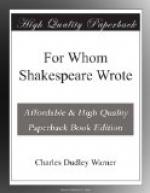did sometimes cheat in the feed, and they with the
tapsters and chamberlains were in league (and the landlord
was not always above suspicion) with highwaymen outside,
to ascertain if the traveler carried any valuables;
so that when he left the hospitable inn he was quite
likely to be stopped on the highway and relieved of
his money. The highwayman was a conspicuous character.
One of the most romantic of these gentry at one time
was a woman named Mary Frith, born in 1585, and known
as Moll Cut-Purse. She dressed in male attire,
was an adroit fencer, a bold rider, and a staunch
royalist; she once took two hundred gold jacobuses
from the Parliamentary General Fairfax on Hounslow
Heath. She is the chief character in Middleton’s
play of the “Roaring Girl”; and after
a varied life as a thief, cutpurse, pickpocket, highwayman,
trainer of animals, and keeper of a thieves’
fence, she died in peace at the age of seventy.
To return to the inns, Fyner Morrison, a traveler
in 1617, sustains all that Harrison says of the inns
as the best and cheapest in the world, where the guest
shall have his own pleasure. No sooner does he
arrive than the servants run to him—one
takes his horse, another shows him his chamber and
lights his fire, a third pulls off his boots.
Then come the host and hostess to inquire what meat
he will choose, and he may have their company if he
like. He shall be offered music while he eats,
and if he be solitary the musicians will give him
good-day with music in the morning. In short,
“a man cannot more freely command at home, in
his own house, than he may do in his inn.”
The amusements of the age were often rough, but certainly
more moral than they were later; and although the
theatres were denounced by such reformers as Stubbes
as seminaries of vice, and disapproved by Harrison;
they were better than after the Restoration, when the
plays of Shakespeare were out of fashion. The
Londoners went for amusement to the Bankside, or South
Side of the Thames, where were the famous Paris Gardens,
much used as a rendezvous by gallants; and there were
the places for bear and bull baiting; and there were
the theatres—the Paris Gardens, the Swan,
the Rose, the Hope, and the Globe. The pleasure-seekers
went over usually in boats, of which there were said
to be four thousand plying between banks; for there
was only one bridge, and that was crowded with houses.
All distinguished visitors were taken over to see
the gardens and the bears baited by dogs; the queen
herself went, and perhaps on Sunday, for Sunday was
the great day, and Elizabeth is said to have encouraged
Sunday sports, she had been (we read) so much hunted
on account of religion! These sports are too brutal
to think of; but there are amusing accounts of lion-baiting
both by bears and dogs, in which the beast who figures
so nobly on the escutcheon nearly always proved himself
an arrant coward, and escaped away as soon as he could
into his den, with his tail between his legs.
The spectators were once much disgusted when a lion
and lioness, with the dog that pursued them, all ran
into the den, and, like good friends, stood very peaceably
together looking out at the people.




